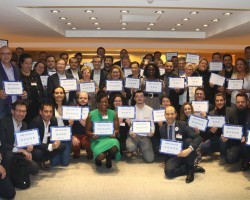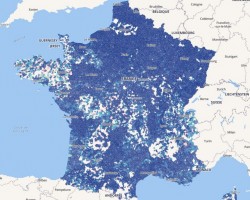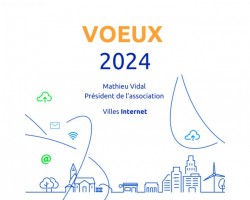
Villes Internet is a Paris-based, cross-party association of elected representatives gathered around the theme of the Citizen’s Internet. It endeavors to assist the implementation of local digital policies. Supported by the French government and more than 20 public and private partners, it constitutes a resource of active monitoring and exchange of experience.
Since 1998, it coordinates a national label and awards one to five « at signs » (or « arobase » in French) to about 200 territories, cities and towns from all 18 regions of metropolitan and overseas France that are eager to pool and showcase their initiatives as well as display a special sign at the city’s entrance. Around 400 communities join every year, represented by their mayor, an elected official, and a referent agent. The Villes Internet network features key local players and policymakers in the public sector: 2000 municipalities, 5000 digital workshops / telecenters, 400 schools, deconcentrated State services such as the CAF (Family Allowance Fund), CCAS (Center for Social Action), Pôle Emploi (Employment Center), public service centers, as well as foreign communities. Boasting the strong and unwavering support of a team of academics and intellectuals, the association is chaired by geographer Emmanuel Eveno, director of the Interdisciplinary Center for Urban Studies.
The association’s timetable is organized by a bureau and an administrative board. The members, comprised for the most part of local or territorial collectivities (a chartered subdivision of the French territory with recognized governing authority), can either be an individual (elected official, municipal agent, facilitator, CEO), or a structure (institutional, private sector, nonmarket sector, popular education).
Main Bodies:
- A scientific council of renown scientists, invited by chairman Emmanuel Eveno – Professor in Toulouse
- A partner council, chaired by distinguished political figure Claudy Lebreton : generalist elected officials associations, state agencies, public service contractors or delegatees of the private sector
- An independent label orientation committee and jury to ensure the neutrality and continuity of the evaluation.
In the Citizen’s Internet ATLAAS, more than 12000 digital services are described by more than 8000 stakeholders and sorted in a repository of territorial development issues. Services to the public are presented by the projects’ carriers, who are encouraged to take a step back in order to express their project and the skill required to see it through.
Villes Internet also proposes a monitoring tool with a local and national Citizen’s Internet Agenda, relays and writes up hundreds of feature articles, and publishes analytic reports—mostly in the form of guides. These productions provide local, national and international policymakers with a shared hindsight on the stakes of digital technology-related mutations in French society: culture, education, democracy, administration, international relations, and the main functions of the City (local economy, transportation, housing, public health, public space management, security…)
Face-to-Face and Remote Access Utilities:
- Two active coworking spaces « L’ESCALE » in Paris and Marseille, hosting exhibitions of local artists
- A team of 6 full-time staff with expertise in project engineering and digital citizenship
- An average baseline budget of 250 K€ in membership fees, completed by public or private contributions for analyses, events or specific actions
- The national Internet Territories, Cities and Towns Label (Label national Territoires, Villes et Villages Internet), materialized by a sign at the city’s entrance in order to display one’s territorial brand by 1 to 5@
- An innovative presentation, evaluation and exchange platform, produced by scientist Michel Authier and structured by a collaborative database using both member input and open public data (INSEE: National Institute of Statistics and Economic Studies, Ministry of the Interior).
2016-2020 Program
- Open up to all French local communities
- Reinforce the network’s legitimacy in the eyes of the State
- Become the hub for local digital policies
- Establish the shared evaluation platform between local digital services
- Contribute to the digital culture of local stakeholders and players
- Entail the societal responsibility of digital businesses
- Feature and bring together the diversity of people involved: elected officials, municipal agents, association representatives, teachers, facilitators, journalists, entrepreneurs)
- Welcome participations from citizens, public agents, employees, artists, etc. to share and collaborate to their digital projects.
The Citizen’s Internet Platform
Succeeding a classic website, Villes Internet presents its network with an e-space dedicated to exchange and assistance whose main themes are international cooperation, digital education, local democracy, social innovation, administrative simplification…
Open data on collectivities from the INSEE and Ministry of the Interior complete data gathered by the association, and feed three online functionalities:
- MAPPING: The Atlaas already geolocates 80 000 stakeholders and 12 000 actions in its actual, two-year-old prefiguration. It allows to learn about them in a referential organized into 16 territorial development issues, themselves declined into 150 services.
- EVALUATION: The label allows agents to describe their initiatives and elected representatives to register a territorial mark, while comparing their digital policies with other participants. The geographic or thematic data proposed by the actors themselves allows for fine and personalized analysis on the basis of diagnoses, barometers and inquiries.
- EXCHANGE HUB: Improving local digital services along the years requires to establish ties between the stakeholders, allowing for the exchange of practices and expertise, and the emergence of projects closer to the public’s needs. The network strives to gather more communities, associations, companies, schools, mediation venues, in order to achieve the implication of the citizens in digital policy-making.
The Association’s Founding Principles
« Digital but grounded »
Dematerializing a process or service doesn’t really work if no thought is given to the rematerialization of the relationship. Every digital service to the citizen can find its address: the user’s domicile, the city or town hall, or a dedicated building. Grounding the service in its context guarantees the respect of local identities, of the patrimony, of the territory’s attractiveness. It also ensures the structuration and mediation of said service in dedicated environments (City Hall, coworking spaces, fablabs, public service centers) under the care of trained or even certified agents.
It is therefore a genuine territorial mark that Villes Internet has been presenting municipalities with for more than 15 years. It indicates a territory where the opportunities of digital technologies are taken into account. The community signifies its political commitment to embrace the digital era by displaying its label on the ton entrance signs. Seeing this signal upon entering the territory certifies it provides an array of quality digital services.
« No digital network without a human network »
Every local society is built on proximity networks without whom the dematerialization and transformation of essential public services is impossible. The solidity of preexisting networks is guaranteed to maintain people’s confidence in remote access services. The face-to-face relationship is a support in order to design the service closest to the different needs. Every longstanding relationships are precious regarding the conception of a sound and simplified dematerialized service. In every city, this confidence has to be nurtured: agent/citizen, constituent/elected official, merchant/association, beneficiary/welfare structure (grant, social housing, health, tourism). Digital technologies and their algorythms may seem to move the policymaker away from the user, yet it actually enhances the service: 24/7 effectiveness, adaptability, acessibility, continuity, sustainability… Moving a digital public service into a territory allows for the implication of its users by making them responsible and enabling them to contribute.
This is the rule Villes Internet has set for itself regarding its 2016-2020 program: automated remote access services for the communities, a constant telephone assistance and guidance, and above all regular meetings in the forms of conferences, a bona fide Tour de France of Internet Cities.
« No inequalities in the digital culture »
Using the Internet is supposed to be instinctive, so would understanding its underlying advantages but also its latent risks be an innate ability? This idea encourages the passive consumption of pre-digested services and prevents one from consciously facing the risks of ideological and commercial manipulation, and the ecological hazards tied to irresponsible use. Learning the rules of digital savoir-vivre provides citizens with useful. The public powers must contribute to the acquisition and diffusion of this digital culture. Impelled by the partnership agreements between academies and collectivities, disseminated at the desks and offices and in the public space, the « good » digital culture strengthens the social link around the values of the Republic. It is under the responsibility of elected officials, territorial agents, associations, trainers… and entrepreneurs.
The numerous facilitators and mediators within the Citizen’s Internet Atlaas offer their methods in accordance to this objective of mediation around the digital culture. Moreover, Villes Internet has entered a partnership agreement with the State to produce a « National Repository for the Training of Elected Officials to Digital Culture « . A collective production, of course!


